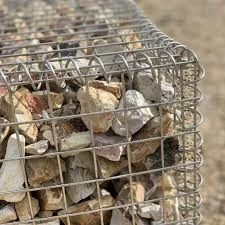-
 Phone:
Phone: -
 Email:
Email:

steel baling wire
The Importance of Steel Baling Wire in Modern Industries
In contemporary manufacturing and recycling operations, steel baling wire plays a crucial role, becoming an indispensable material in the management and processing of various products. This robust, high-tensile wire is primarily used for binding and packaging materials into compact bales, which can significantly streamline logistics and enhance overall efficiency. With its wide array of applications across different sectors, understanding the properties and advantages of steel baling wire is essential for those involved in industries that rely on material handling, including recycling, agriculture, and shipping.
Composition and Types of Steel Baling Wire
Steel baling wire is typically made from high-carbon steel, which provides excellent strength and durability. The wire is often coated with materials such as zinc to enhance its corrosion resistance, thereby prolonging its lifespan, especially in outdoor conditions or environments prone to moisture. There are generally two main types of steel baling wire Black annealed and galvanized. Black annealed wire is softer and more malleable, making it easier to work with, while galvanized wire is treated to resist rust, making it suitable for outdoor use or in moist environments.
Applications in Recycling
One of the most significant applications of steel baling wire is in the recycling industry. Recyclables such as cardboard, paper, plastic, and metals are often processed into bales for easier transportation and storage. Steel baling wire securely binds these materials, allowing recycling facilities to manage large volumes of waste more effectively. The compact size of bales not only saves space but also reduces transportation costs, making recycling more economical and environmentally friendly. Furthermore, using steel baling wire helps maintain the integrity of the bales during transit, minimizing breakage and loss of the materials being shipped.
Role in Agriculture
steel baling wire

In the agricultural sector, steel baling wire is widely utilized for binding hay and straw bales. Farmers rely on it to secure their harvest for storage and transportation. The strength and reliability of steel baling wire ensure that these agricultural products remain intact, preventing spoilage and loss due to exposure. Moreover, the ability to create tightly bound bales maximizes storage efficiency, allowing farmers to optimize their space and manage their produce effectively.
Benefits of Steel Baling Wire
The benefits of using steel baling wire extend beyond strength and durability. It is highly adaptable, with different gauges available to suit various applications. This versatility means that industries can select the appropriate wire thickness for their specific needs, enhancing productivity and cost-effectiveness. Additionally, compared to other binding materials such as plastic or twine, steel baling wire provides superior tensile strength, ensuring that bales remain securely bound under considerable weight and pressure.
Environmental Considerations
As industries increasingly focus on sustainability and reducing their environmental footprint, the use of steel baling wire contributes positively to these efforts. Steel is a highly recyclable material, and the wire can be reused or repurposed at the end of its life cycle. This alignment with recycling principles adds to the ecological benefits, promoting practices that contribute to a circular economy.
Conclusion
Steel baling wire is a fundamental component in various industries, especially in recycling and agriculture. Its strength, durability, and adaptability make it an optimal choice for binding and packaging, improving efficiency and cost-effectiveness in operations. As global industries continue to prioritize sustainability, the importance of steel baling wire will undoubtedly rise, reflecting its vital role in creating a more efficient and environmentally responsible future. Whether in managing waste or preserving agricultural products, steel baling wire remains an essential tool that supports modern industrial practices.
-
Wire Mesh for Every Need: A Practical SolutionNewsJul.25,2025
-
Steel Fences: Durable, Secure, and Stylish OptionsNewsJul.25,2025
-
Roll Top Fencing: A Smart Solution for Safety and SecurityNewsJul.25,2025
-
Cattle Farm Fencing Solutions for Maximum SecurityNewsJul.25,2025
-
Affordable Iron Binding Wire SolutionsNewsJul.25,2025
-
Affordable Galvanized Wire SolutionsNewsJul.25,2025
-
Wire Hanger Recycling IdeasNewsJul.25,2025








